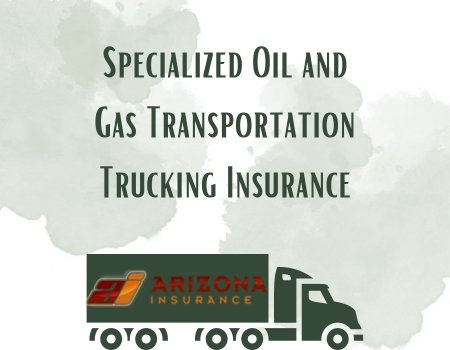The oil and gas industry is the lifeblood of modern civilization, fueling transportation, powering homes, and driving industrial processes. The safe and efficient transport of these vital resources is crucial, and the trucking companies that navigate this complex landscape face unique risks. Standard commercial truck insurance might not provide adequate coverage for the specialized needs of oil and gas transportation.
Understanding Specialized Oil and Gas Transportation Trucking Insurance
 Understanding the Risks: A Volatile Landscape
Understanding the Risks: A Volatile Landscape
Oil and gas transportation involves hauling highly volatile and potentially hazardous materials. Accidents involving oil spills, gas leaks, or pipeline ruptures can have devastating consequences, causing environmental damage, property loss, and even fatalities.
Beyond the inherent dangers of the cargo, oil and gas transportation trucks often operate in harsh environments and navigate challenging terrains. These factors contribute to a higher risk of accidents and equipment breakdowns.
The Foundation: Essential Liability Coverage
Every oil and gas trucking company needs a robust insurance foundation built on the following key policies:
- Motor Truck Cargo: This policy is crucial. It covers financial losses arising from damage or loss of the oil and gas cargo during transportation due to accidents, fire, theft, or other covered perils. The specific coverage limits will depend on the type and value of the cargo you haul, as well as contractual obligations with shippers.
- Auto Liability: This is the cornerstone of your commercial truck insurance. It covers bodily injury and property damage claims arising from accidents you or your drivers cause to others. Standard commercial auto liability policies may not be sufficient for oil and gas transportation. Consider policies with higher limits to accommodate the potential severity of accidents involving hazardous materials.
Specialized Coverage for Enhanced Protection
Beyond the core liability coverage, oil and gas trucking companies benefit from specialized insurance policies tailored to their unique risks:
- Pollution Liability: This policy provides financial protection in case of accidental spills or leaks of oil and gas products during transportation. Cleanup costs for environmental contamination can be astronomical, and this insurance helps mitigate the financial burden of such incidents.
- Motor Truck Contingent Cargo: This policy covers situations where another party, such as a loading dock operator, is responsible for damaging your cargo during the loading or unloading process. Standard cargo insurance might not cover these scenarios, and contingent cargo insurance provides vital protection.
- Non-Trucking Liability (Hook & Winch): Oil and gas transportation often involves maneuvering trucks in challenging situations. This policy extends liability coverage to incidents that occur while your truck is engaged in non-transport activities, such as using a winch or crane to load or unload cargo.
- Excess Liability (Umbrella Insurance): You may want to opt for an umbrella policy to give you more protection. It acts as a safety net, kicking in after your primary liability coverage limits are exhausted. This is crucial in case of a major accident or lawsuit with high damages.
Specialized Equipment, Specialized Coverage
Oil and gas transportation often involves specialized equipment beyond standard trucks. Trailer types like tankers, vacuum trucks, and pressure vessels require specific insurance coverage:
- Pollution Liability for Trailers: Ensure your pollution liability coverage extends to damage caused by spills or leaks from specialized trailers used for oil and gas transportation.
- Hired & Non-Hired Physical Damage: If you lease or rent trailers, consider hired physical damage coverage to protect them from damage. Non-hired physical damage covers your own specialized trailers in case of accidents, theft, or other covered perils.
- Boiler & Machinery: Specialized equipment like pumps and compressors used in oil and gas transportation can be expensive to repair or replace. Boiler and machinery insurance covers these risks, ensuring your operations are not significantly disrupted due to equipment failure.
Protecting Your Workforce: Workers’ Compensation
Workers’ compensation insurance is mandatory in most states and is crucial for oil and gas trucking companies. The physically demanding nature of oil and gas transportation operations can put workers at higher risk, making comprehensive workers’ compensation coverage essential.
General Liability: Beyond the Road
While not specific to trucks, general liability insurance can be crucial for oil and gas trucking companies. It covers bodily injury and property damage claims arising from non-trucking related incidents at your office, terminal, or maintenance facilities. For example, if a customer slips and falls on your property, general liability insurance can provide coverage.
Risk Management: Preventing the Incident
While insurance provides financial protection, prioritizing safety is paramount. Implementing a robust risk management program can significantly reduce the risk of accidents and claims. This program should include:
- Comprehensive driver training: Regular training on safe driving practices, handling hazardous materials specific to oil and gas transportation (flammable liquids, compressed gases, etc.), emergency response procedures, and defensive driving techniques is crucial.
- Rigorous vehicle maintenance: Establish a preventative maintenance program to ensure your trucks and trailers are in top condition. Regular inspections, timely servicing, and prompt repairs of any mechanical issues are essential to prevent breakdowns and accidents.
- Compliance with regulations: There are heavy regulations guiding the oil and gas industry. Ensuring your company and drivers comply with all federal and state regulations regarding hazardous materials transportation, driver qualifications, and vehicle safety standards is vital.
- Drug and alcohol testing: Implementing a robust drug and alcohol testing program for drivers helps maintain a safe working environment and reduces the risk of accidents caused by impairment.
Comprehensive insurance coverage acts as a financial safety net, allowing you to focus on what matters most – delivering your cargo safely and efficiently, while protecting your employees and the environment. With proper planning and risk management, oil and gas trucking companies can ensure a smooth ride on the road to success.
